The yard is the pride and joy of every homeowner. A lot of time and effort go into a well-manicured lawn, so it only makes sense that homeowners strive to keep the lawn looking pristine throughout the year. So, if you have a neighbor who blows leaves into your yard, you're likely quite frustrated. But how exactly should you go about handling this problem? We did the research to bring you a solution.
From a legal standpoint, one isn't allowed to blow leaves into a neighbor's yard, even if the leaves fell from a tree located in said neighbor's yard. Simply put, if leaves fall and end up in your yard, they are your responsibility to clean up.
If your neighbor blows leaves into your yard, take the following steps:
- Ensure adequate fencing exists between both yards to limit the number of leaves that make it into the neighbor's yard.
- Approach the neighbor and politely inform them that disposing of the leaves that end up in their yard is their legal responsibility.
- If the leaves originate from a tree in your yard, try to arrange a way to help the neighbor dispose of them to keep the peace in the neighborhood.
- If diplomacy fails, take legal action as a last resort.
If you still have some questions about navigating this uncomfortable situation, don't worry. In this post, we'll discuss the topic in more detail. We'll also talk about how to keep leaves out of your yard and more. Without further ado, let's get into it!
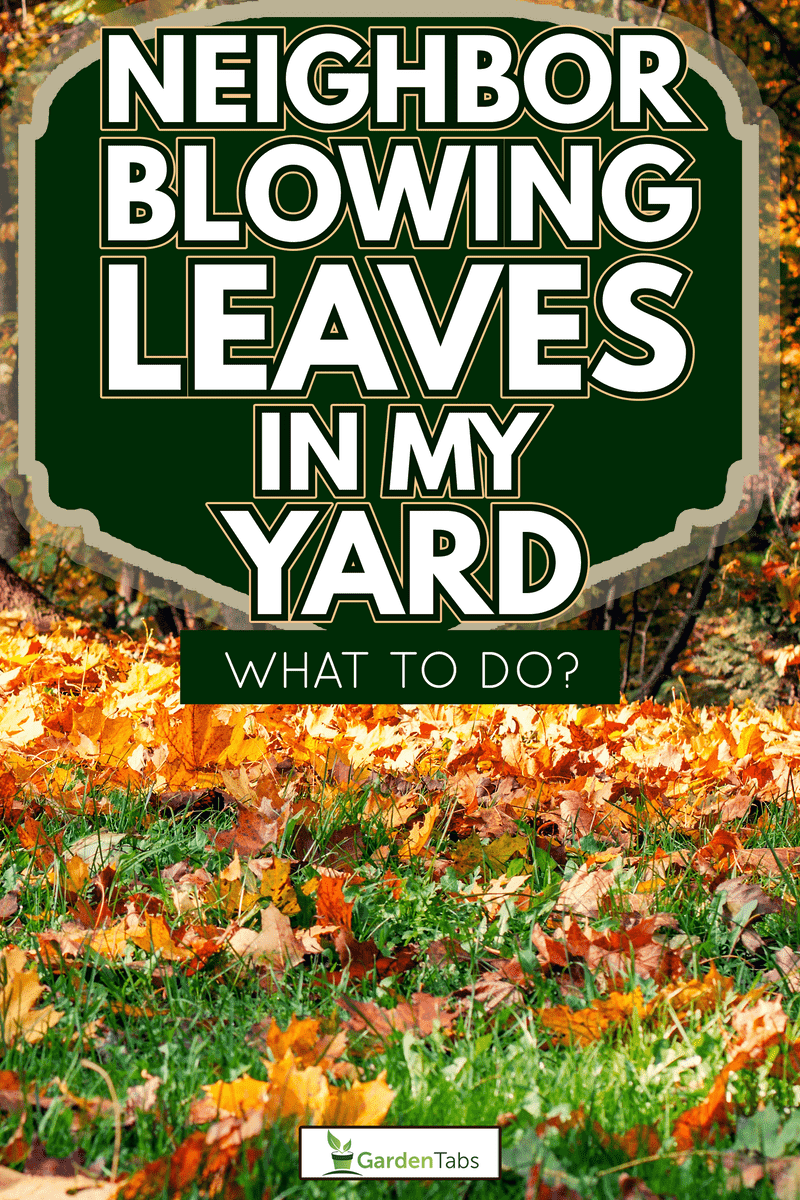
How Do I Stop My Neighbor From Blowing Leaves In My Yard?
A neighbor blowing leaves into your yard is frustrating, to say the least. If the leaves originate from a tree in your yard, your neighbor is undoubtedly firm in their belief that the leaves are your responsibility. After all, they came from your tree, so they are yours to deal with, right?
As it turns out, this actually isn't the case. While this might seem reasonable enough, the law states otherwise. Simply put, fallen leaves are the responsibility of the one who owns the property on which they end up.
In other words, your tree could have branches that extend over the property line into your neighbor's yard, and the leaves that fall into their yard are still their responsibility to clean up. The only caveat to this is if your tree is damaging your neighbor's property, but that's not the scenario we're focusing on here.
Now that the legal element of this situation has been established, let's look at how you should handle it.
1. Ensure Adequate Fencing Exists Between Both Yards
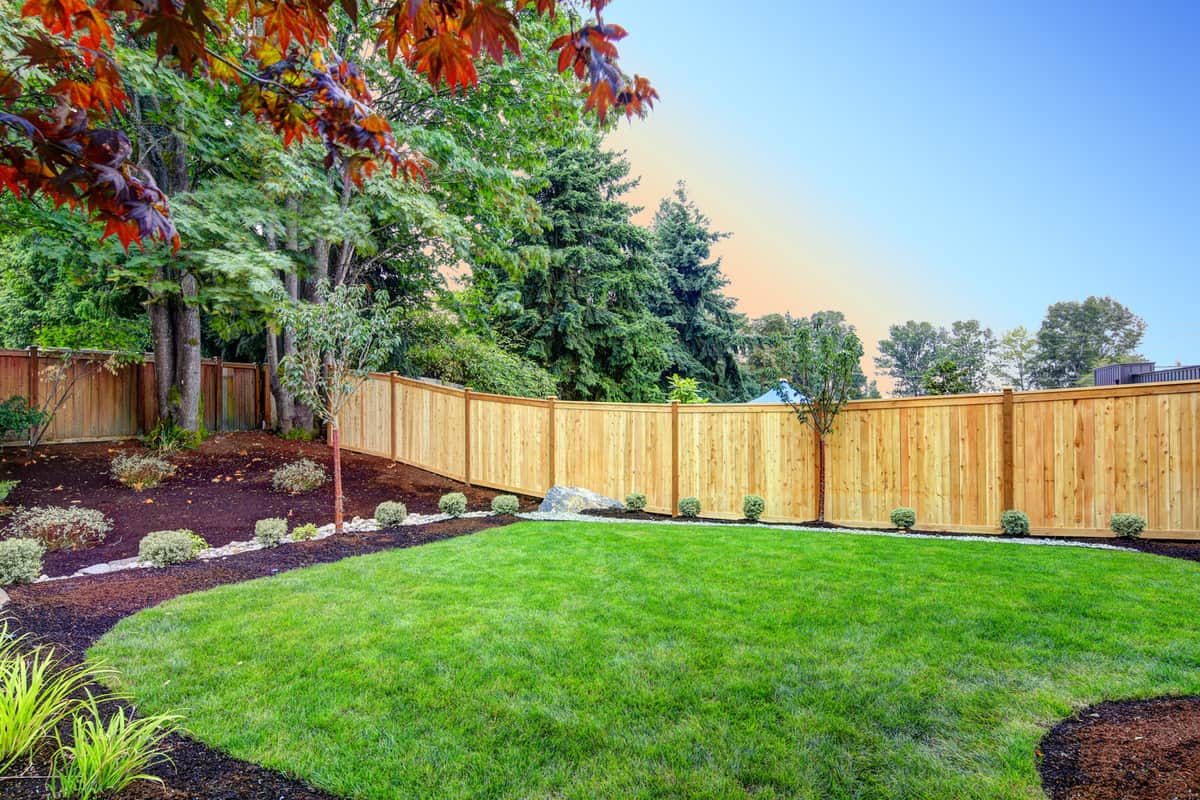
First and foremost, do your part to ensure that there is adequate fencing between your yard and your neighbor's yard, especially if the leaves in question originate from your tree.
There are several options out there to limit the number of leaves that make their way into surrounding yards, from construction fencing to a standard wooden fence. The bottom line is to ensure that you do everything you can to keep leaves confined to your yard.
2. Politely Inform Your Neighbor Of Their Responsibility

Conflict between neighbors can get messy, especially when the parties involved take a passive-aggressive approach to the conflict. However, this approach only escalates issues.
So, in this case, the first thing you should do is politely inform your neighbor of the law surrounding fallen leaves, namely that the leaves are their responsibility if they naturally end up on their property; legally speaking, the point of origin is irrelevant.
Odds are your neighbor isn't aware of this. As mentioned, they probably maintain that leaves are the responsibility of the tree owner. And while this view certainly makes sense, you might have to kindly let your neighbor know that this isn't the case.
When you have this discussion, approach it as diplomatically as possible in order to keep the peace in the neighborhood.
3. Work Together To Find A Solution
Depending on how your neighbor takes the news that the leaves are, in fact, their responsibility, consider meeting them halfway and coming up with a solution. Take a minute to put yourself in your neighbor's shoes; consider how you would feel if the roles were reversed.
While the leaves that end up in their yard are legally their responsibility, it's still a good idea to make an effort to help your neighbor clean up leaves from time to time if they came from a tree in your yard.
This can pay dividends when it comes to keeping the peace and fostering good relations with neighbors. Simply put, it's the right thing to do.
4. Pursue Legal Action As A Last Resort
If the solutions outlined above don't rectify the issue, then pursuing legal action is the next step. But before we go any further, it's important to note that the decision to take legal action against your neighbor should not be taken lightly. Once you start down this path, there's no going back.
Simply put, taking legal action will undoubtedly soil the relationship between you and your neighbor indefinitely. So, before you decide to bring down the hammer of justice on your neighbor, take some time to really think it through. Legal action should be a last resort.
Should you deem it necessary to go the legal route, contact your city to lodge a complaint. In order to strengthen your case, consider installing exterior cameras if you don't have them already.
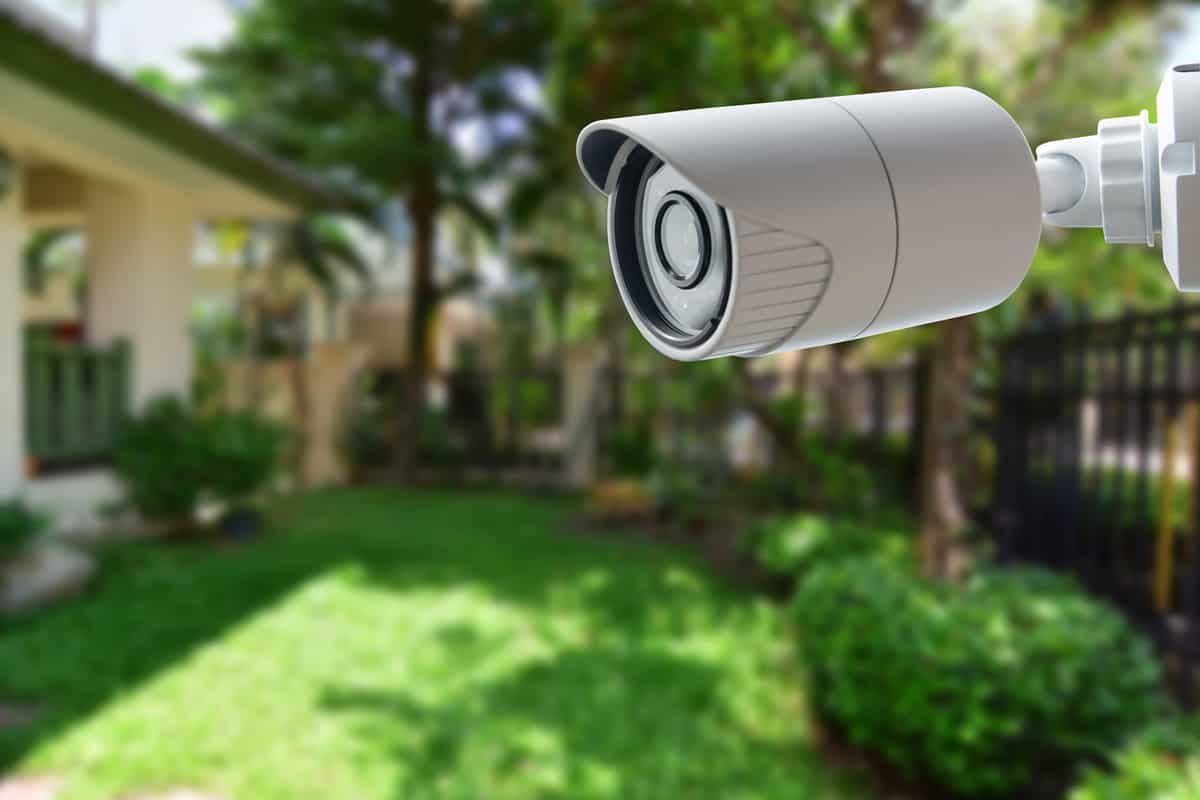
This can help you provide solid evidence to the authorities, which will prevent the conflict from appearing to be a he-said-she-said issue and being dismissed as such.
How Do You Keep Leaves Out Of Your Yard?
Nobody likes leaves in their yard, but unfortunately, as long as there are nearby trees, getting leaves in your yard is simply inevitable. With that said, there are a few things you can do to keep your yard looking great throughout the fall.
Invest In A Good Rake
A good rake is essential when it comes to keeping your yard nice and tidy during the fall. The right rake can make it significantly easier to rid your lawn of leaves. Once you have a high-quality rake, simply rake as needed.
Click here to see this rake on Amazon.
Invest In A Good Blower
A good blower is just as important as a good rake when it comes to ridding your yard of leaves. A blower is particularly useful for getting leaves off patios, sidewalks, and other hard surfaces.
Click here to see this Husqvarna leaf blower on Amazon.
Keep Your Trees Trimmed
Ensure that any trees in your yard are trimmed as needed throughout the year. When branches are trimmed off trees, quite a few leaves go with them, and this can reduce the number of fallen leaves that end up in your yard during the fall.
What Happens If You Don't Clean Up Leaves?
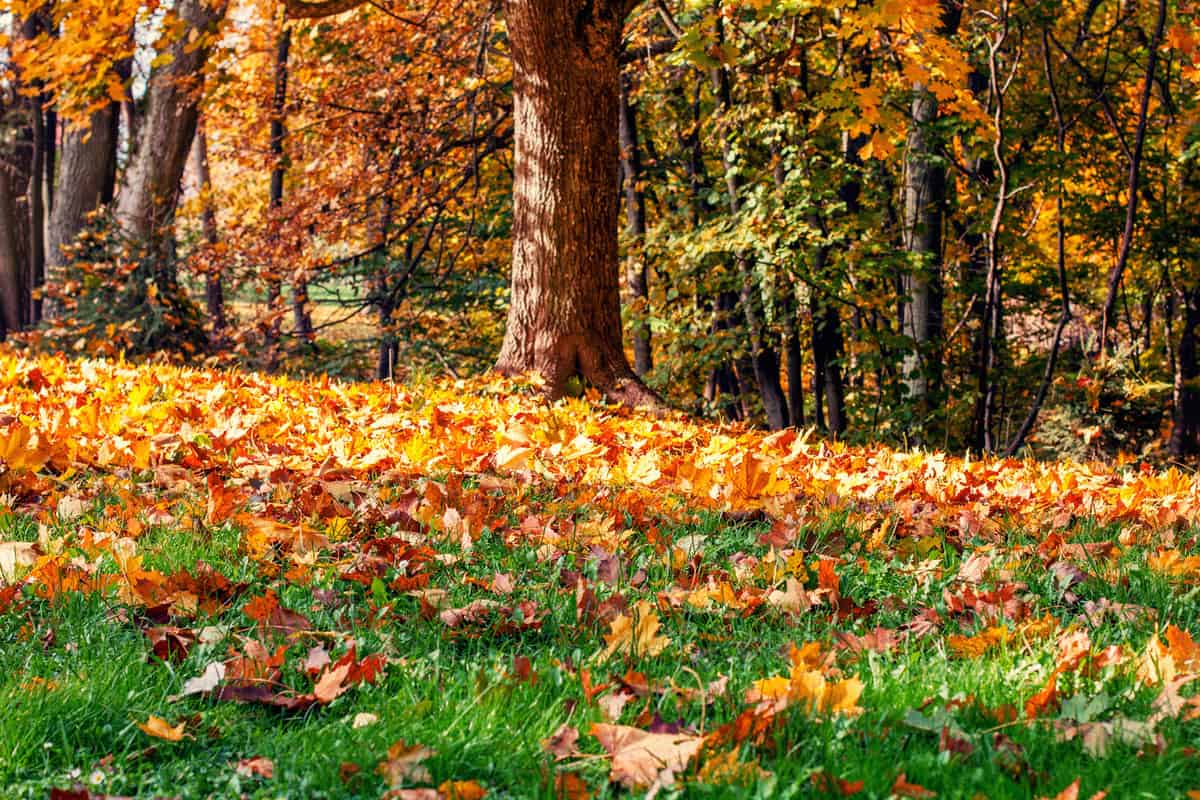
Let's face it—raking leaves throughout the fall can get exhausting. So, you might be wondering what might happen if you simply don't clean up fallen leaves.
As it turns out, opting to forgo raking up leaves can actually benefit your lawn. Dead leaves return vital nutrients back into the soil, essentially serving as a natural fertilizer. However, there is a major caveat. Letting a substantial number of leaves accumulate on your lawn can have adverse effects on your lawn.
If the layer of leaves gets too thick, the underlying grass won't be able to get the air, sunlight, and nutrients it needs to grow. In addition, if the layer of leaves gets wet, it can promote fungal growth.
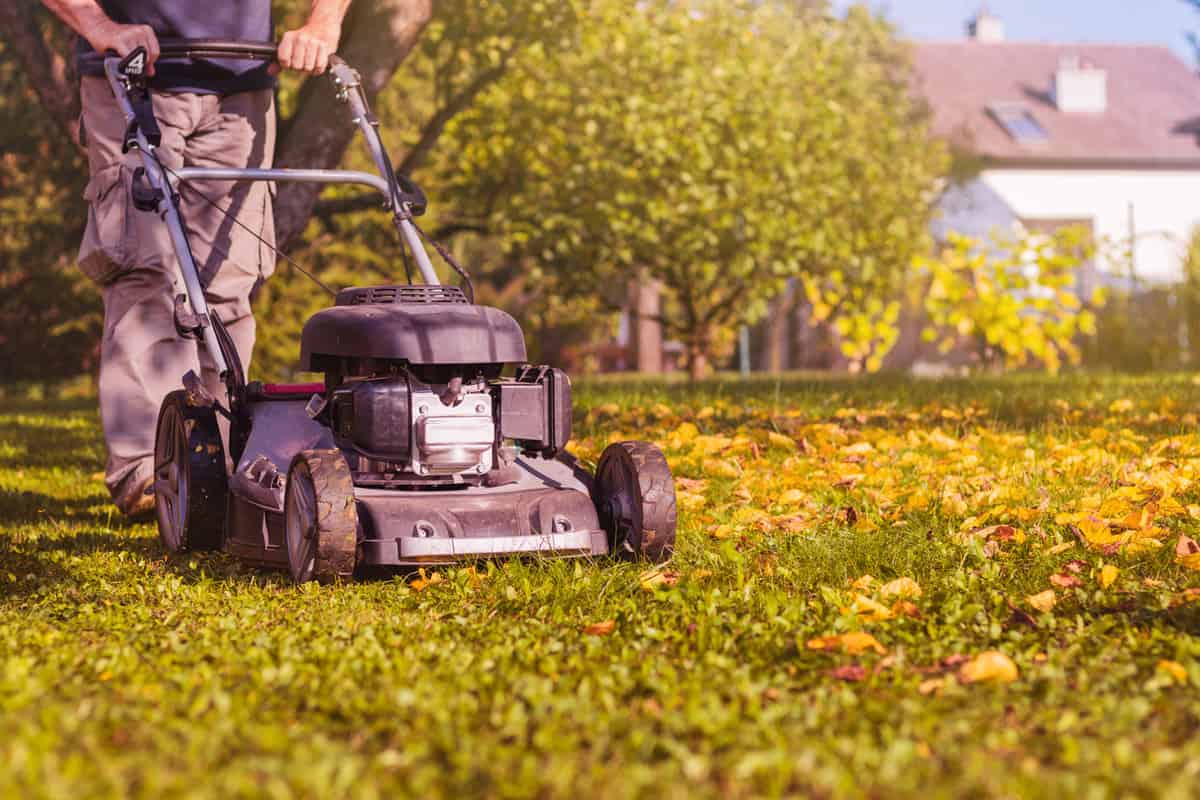
In order to maximize the fertilizing properties of dead leaves and prevent any adverse effects a layer of leaves might have on your yard, regularly mulch the leaves with a lawn mower.
Mulching the leaves will grind them up into smaller pieces. This will facilitate decomposition and ensure that the lawn has access to air, sunlight, and nutrients.
In Closing
We hope this guide has helped you better understand the legality surrounding neighbors, trees, and leaves. Remember, diplomacy and kindness are essential to keeping the peace in the neighborhood. Good luck!
Before you go, be sure to take a look at these other related guides:
Should You Edge Your Lawn Or Mow First? [What You Need To Know]


